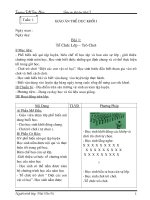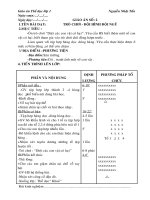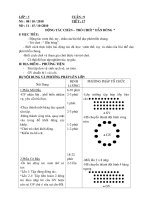The marble faun vol 2
Bạn đang xem bản rút gọn của tài liệu. Xem và tải ngay bản đầy đủ của tài liệu tại đây (912.24 KB, 193 trang )
ProjectGutenberg'sTheMarbleFaun,VolumeII.,byNathanielHawthorne
ThiseBookisfortheuseofanyoneanywhereatnocostandwith
almostnorestrictionswhatsoever.Youmaycopyit,giveitawayor
re-useitunderthetermsoftheProjectGutenbergLicenseincluded
withthiseBookoronlineatwww.gutenberg.org
Title:TheMarbleFaun,VolumeII.
TheRomanceofMonteBeni
Author:NathanielHawthorne
ReleaseDate:February25,2006[EBook#2182]
LastUpdated:December15,2016
Language:English
***STARTOFTHISPROJECTGUTENBERGEBOOKTHEMARBLEFAUN,VOLUMEII.***
ProducedbyMichaelPullenandDavidWidger
THEMARBLEFAUN,
orTheRomanceofMonteBeni
BYNATHANIELHAWTHORNE
VolumeII.InTwoVolumes
Contents
THEMARBLEFAUN,VOLUMEII.
CHAPTERXXIV
THETOWERAMONGTHEAPENNINES
CHAPTERXXV
SUNSHINE
CHAPTERXXVI
THEPEDIGREEOFMONTEBENI
CHAPTERXXVII
MYTHS
CHAPTERXXVIII
THEOWLTOWER
CHAPTERXXIX
ONTHEBATTLEMENTS
CHAPTERXXX
DONATELLO’SBUST
CHAPTERXXXI
THEMARBLESALOON
CHAPTERXXXII
SCENESBYTHEWAY
CHAPTERXXXIII
PICTUREDWINDOWS
CHAPTERXXXIV
MARKET-DAYINPERUGIA
CHAPTERXXXV
THEBRONZEPONTIFF’SBENEDICTION
CHAPTERXXXVI
HILDA’STOWER
CHAPTERXXXVII
THEEMPTINESSOFPICTUREGALLERIES
CHAPTERXXXVIII ALTARSANDINCENSE
CHAPTERXXXIX
THEWORLD’SCATHEDRAL
CHAPTERXL
HILDAANDAFRIEND
CHAPTERXLI
SNOWDROPSANDMAIDENLYDELIGHTS
CHAPTERXLII
REMINISCENCESOFMIRIAM
CHAPTERXLIII
THEEXTINCTIONOFALAMP
CHAPTERXLIV
THEDESERTEDSHRINE
CHAPTERXLV
THEFLIGHTOFHILDA’SDOVES
CHAPTERXLVI
AWALKONTHECAMPAGNA
CHAPTERXLVII
THEPEASANTANDCONTADINA
CHAPTERXLVIII
ASCENEINTHECORSO
CHAPTERXLIX
AFROLICOFTHECARNIVAL
CHAPTERL
MIRIAM,HILDA,KENYON,DONATELLO
CONCLUSION
THEMARBLEFAUN
VolumeII
CHAPTERXXIV
THETOWERAMONGTHEAPENNINES
ItwasinJunethatthesculptor,Kenyon,arrivedonhorsebackatthegateofan
ancientcountryhouse(which,fromsomeofitsfeatures,mightalmostbecalled
acastle)situatedinapartofTuscanysomewhatremotefromtheordinarytrack
of tourists. Thither we must now accompany him, and endeavor to make our
storyflowonward,likeastreamlet,pastagraytowerthatrisesonthehillside,
overlooking a spacious valley, which is set in the grand framework of the
Apennines.
ThesculptorhadleftRomewiththeretreatingtideofforeignresidents.For,as
summerapproaches,theNiobeofNationsismadetobewailanew,anddoubtless
with sincerity, the loss of that large part of her population which she derives
fromotherlands,andonwhomdependsmuchofwhateverremnantofprosperity
she still enjoys. Rome, at this season, is pervaded and overhung with
atmospheric terrors, and insulated within a charmed and deadly circle. The
crowdofwanderingtouristsbetakethemselvestoSwitzerland,totheRhine,or,
from this central home of the world, to their native homes in England or
America,whichtheyareaptthenceforwardtolookuponasprovincial,afteronce
havingyieldedtothespelloftheEternalCity.Theartist,whocontemplatesan
indefinitesuccessionofwintersinthishomeofart(thoughhisfirstthoughtwas
merely toimprovehimselfby abriefvisit),goesforth,inthesummertime,to
sketch scenery and costume among the Tuscan hills, and pour, if he can, the
purple air of Italy over his canvas. He studies the old schools of art in the
mountaintownswheretheywereborn,andwheretheyarestilltobeseeninthe
fadedfrescosofGiottoandCimabue,onthewallsofmanyachurch,orinthe
darkchapels,inwhichthesacristandrawsasidetheveilfromatreasuredpicture
ofPerugino.Thence,thehappypaintergoestowalkthelong,brightgalleriesof
Florence,ortostealglowingcolorsfromthemiraculousworks,whichhefinds
inascoreofVenetianpalaces.Suchsummersasthese,spentamidwhateveris
exquisite in art, or wild and picturesque in nature, may not inadequately repay
him for the chill neglect and disappointment through which he has probably
languished,inhisRomanwinter.Thissunny,shadowy,breezy,wanderinglife,in
which he seeks for beauty as his treasure, and gathers for his winter’s honey
what is but a passing fragrance to all other men, is worth living for, come
afterwardswhatmay.Evenifhedieunrecognized,theartisthashadhisshareof
enjoymentandsuccess.
Kenyonhadseen,atadistanceofmanymiles,theoldvillaorcastletowards
whichhisjourneylay,lookingfromitsheightoverabroadexpanseofvalley.As
he drew nearer, however, it had been hidden among the inequalities of the
hillside, until the winding road brought him almost to the iron gateway. The
sculptorfoundthissubstantialbarrierfastenedwithlockandbolt.Therewasno
bell,norotherinstrumentofsound;and,aftersummoningtheinvisiblegarrison
withhisvoice,insteadofatrumpet,hehadleisuretotakeaglanceattheexterior
ofthefortress.
Aboutthirtyyardswithinthegatewayroseasquaretower,loftyenoughtobe
averyprominentobjectinthelandscape,andmorethansufficientlymassivein
proportion to its height. Its antiquity was evidently such that, in a climate of
more abundant moisture,the ivywouldhave mantleditfromhead tofoot in a
garmentthatmight, bythistime,havebeencenturiesold, thoughevernew.In
the dry Italian air, however, Nature had only so far adopted this old pile of
stonework as to cover almost every hand’s-breadth of it with close-clinging
lichens and yellow moss; and the immemorial growth of these kindly
productionsrenderedthegeneralhueofthetowersoftandvenerable,andtook
awaytheaspectofnakednesswhichwouldhavemadeitsagedrearierthannow.
Up and down the height of the tower were scattered three or four windows,
the lower ones grated with iron bars, the upper ones vacant both of window
frames and glass. Besides these larger openings, there were several loopholes
andlittle square apertures, which mightbesupposed to lightthestaircase,that
doubtless climbed the interior towards the battlemented and machicolated
summit.Withthislast-mentionedwarlikegarnitureuponitssternoldheadand
brow, the tower seemed evidently a stronghold of times long past. Many a
crossbowmanhadshothisshaftsfromthosewindowsandloop-holes,andfrom
thevantageheightofthosegraybattlements;manyaflightofarrows,too,had
hit all round about the embrasures above, or the apertures below, where the
helmetofadefenderhadmomentarilyglimmered.Onfestalnights,moreover,a
hundredlampshadoftengleamedafaroverthevalley,suspendedfromtheiron
hooks that were ranged for the purpose beneath the battlements and every
window.
Connectedwiththetower,andextendingbehindit,thereseemedtobeavery
spacious residence, chiefly of more modern date. It perhaps owed much of its
fresherappearance,however,toacoatofstuccoandyellowwash,whichisasort
of renovation very much in vogue with the Italians. Kenyon noticed over a
doorway,intheportionoftheedificeimmediatelyadjacenttothetower,across,
which, with a bell suspended above the roof, indicated that this was a
consecratedprecinct,andthechapelofthemansion.
Meanwhile, the hot sun so incommoded the unsheltered traveller, that he
shouted forth another impatient summons. Happening, at the same moment, to
lookupward,hesawafigureleaningfromanembrasureofthebattlements,and
gazingdownathim.
“Ho, Signore Count!” cried the sculptor, waving his straw hat, for he
recognized the face, after a moment’s doubt. “This is a warm reception, truly!
Praybidyourporterletmein,beforethesunshrivelsmequiteintoacinder.”
“Iwillcomemyself,”respondedDonatello,flingingdownhisvoiceoutofthe
clouds,asitwere;“oldTomasoandoldStellaarebothasleep,nodoubt,andthe
rest of the people are in the vineyard. But I have expected you, and you are
welcome!”
The young Count—as perhaps we had better designate him in his ancestral
tower—vanished from the battlements; and Kenyon saw his figure appear
successivelyateachofthewindows,ashedescended. On everyreappearance,
heturnedhisfacetowardsthesculptorandgaveanodandsmile;forakindly
impulsepromptedhimthustoassurehisvisitorofawelcome,afterkeepinghim
solongataninhospitablethreshold.
Kenyon, however (naturally and professionally expert at reading the
expressionofthehumancountenance),hadavaguesensethatthiswasnotthe
young friend whom he had known so familiarly in Rome; not the sylvan and
untutored youth, whom Miriam, Hilda, and himself had liked, laughed at, and
sported with; not the Donatello whose identity they had so playfully mixed up
withthatoftheFaunofPraxiteles.
Finally, when his host had emerged from a side portal of the mansion, and
approachedthegateway,thetravellerstillfeltthattherewassomethinglost,or
something gained (he hardly knew which), that set the Donatello of to-day
irreconcilablyatoddswithhimofyesterday.Hisverygaitshowedit,inacertain
gravity, a weight and measure of step, that had nothing in common with the
irregular buoyancy which used to distinguish him. His face was paler and
thinner,andthelipslessfullandlessapart.
“I have looked for you a long while,” said Donatello; and, though his voice
soundeddifferently,andcutoutitswordsmoresharplythanhadbeenitswont,
still there was a smile shining on his face, that, for the moment, quite brought
backtheFaun.“Ishallbemorecheerful,perhaps,nowthatyouhavecome.Itis
verysolitaryhere.”
“I have come slowly along, often lingering, often turning aside,” replied
Kenyon; “for I found a great deal to interest me in the mediaeval sculpture
hiddenawayinthechurcheshereabouts.Anartist,whetherpainterorsculptor,
maybepardonedforloiteringthroughsucharegion.Butwhatafineoldtower!
Its tall front is like a page of black letter, taken from the history of the Italian
republics.”
“Iknowlittleornothingofitshistory,”saidtheCount,glancingupwardatthe
battlements, where he had just been standing. “But I thank my forefathers for
building it so high. I like the windy summit better than the world below, and
spendmuchofmytimethere,nowadays.”
“Itisapityyouarenotastar-gazer,”observedKenyon,alsolookingup.“Itis
higherthanGalileo’stower,whichIsaw,aweekortwoago,outsideofthewalls
ofFlorence.”
“Astar-gazer?Iamone,”repliedDonatello.“Isleepinthetower, andoften
watch very late on the battlements. There is a dismal old staircase to climb,
however, before reaching the top, and a succession of dismal chambers, from
storytostory.Someofthemwereprisonchambersintimespast,asoldTomaso
willtellyou.”
Therepugnanceintimatedinhistoneattheideaofthisgloomystaircaseand
theseghostly,dimlylightedrooms,remindedKenyonoftheoriginalDonatello,
muchmorethanhispresentcustomofmidnightvigilsonthebattlements.
“Ishallbegladtoshareyourwatch,”saidtheguest;“especiallybymoonlight.
The prospect of this broad valley must be very fine. But I was not aware, my
friend, that these were your country habits. I have fancied you in a sort of
Arcadian life, tasting rich figs, and squeezing the juice out of the sunniest
grapes,andsleepingsoundlyallnight,afteradayofsimplepleasures.”
“I may have known such a life, when I was younger,” answered the Count
gravely.“Iamnotaboynow.Timefliesoverus,butleavesitsshadowbehind.”
The sculptor could not but smile at the triteness of the remark, which,
nevertheless,hadakindoforiginalityascomingfromDonatello.Hehadthought
it out from his own experience, and perhaps considered himself as
communicatinganewtruthtomankind.
Theywerenowadvancingupthecourtyard;andthelongextentofthevilla,
with its iron-barred lower windows and balconied upper ones, became visible,
stretchingbacktowardsagroveoftrees.
“At some period of your family history,” observed Kenyon, “the Counts of
MonteBenimusthaveledapatriarchallifeinthisvasthouse.Agreat-grandsire
and all his descendants might find ample verge here, and with space, too, for
eachseparatebroodoflittleonestoplaywithinitsownprecincts.Isyourpresent
householdalargeone?”
“Onlymyself,”answeredDonatello,“andTomaso,whohasbeenbutlersince
mygrandfather’stime,andoldStella,whogoessweepinganddustingaboutthe
chambers,andGirolamo,thecook,whohasbutanidlelifeofit.Heshallsend
youupachickenforthwith.But,firstofall,Imustsummononeofthecontadini
fromthefarmhouseyonder,totakeyourhorsetothestable.”
Accordingly,theyoungCountshoutedagain,andwithsucheffectthat,after
several repetitions of the outcry, an old gray woman protruded her head and a
broom-handle from a chamber window; the venerable butler emerged from a
recessinthesideofthehouse,wherewasawell,orreservoir,inwhichhehad
beencleansingasmallwinecask;andasunburntcontadino,inhisshirt-sleeves,
showed himself on the outskirts of the vineyard, with some kind of a farming
toolinhishand.Donatellofoundemploymentforalltheseretainersinproviding
accommodation for his guest and steed, and then ushered the sculptor into the
vestibuleofthehouse.
It was a square and lofty entrance-room, which, by the solidity of its
construction, might have been an Etruscan tomb, being paved and walled with
heavyblocksofstone,andvaultedalmostasmassivelyoverhead.Ontwosides
thereweredoors,openingintolongsuitesofanteroomsandsaloons;onthethird
side,astonestaircaseofspaciousbreadth,ascending,bydignifieddegreesand
withwideresting-places,toanotherfloorofsimilarextent.Throughoneofthe
doors, which was ajar, Kenyon beheld an almost interminable vista of
apartments, opening one beyond the other, and reminding him of the hundred
rooms in Blue Beard’s castle, or the countless halls in some palace of the
ArabianNights.
Itmusthavebeenanumerousfamily,indeed,thatcouldeverhavesufficedto
people with human life so large an abode as this, and impart social warmth to
such a wide world within doors. The sculptor confessed to himself, that
Donatellocouldallegereasonenoughforgrowingmelancholy,havingonlyhis
ownpersonalitytovivifyitall.
“Howawoman’sfacewouldbrightenitup!”heejaculated,notintendingto
beoverheard.
But, glancing at Donatello, he saw a stern and sorrowful look in his eyes,
whichalteredhisyouthfulfaceasifithadseenthirtyyearsoftrouble;and,atthe
same moment, old Stella showed herself through one of the doorways, as the
onlyrepresentativeofhersexatMonteBeni.
CHAPTERXXV
SUNSHINE
“Come,”saidtheCount,“Iseeyoualreadyfindtheoldhousedismal.SodoI,
indeed! And yet it was a cheerful place in my boyhood. But, you see, in my
father’sdays(andthesamewastrueofallmyendlesslineofgrandfathers,asI
haveheard),thereusedtobeuncles,aunts,andallmannerofkindred,dwelling
together as one family. They were a merry and kindly race of people, for the
mostpart,andkeptoneanother’sheartswarm.”
“Twoheartsmightbeenoughforwarmth,”observedthesculptor,“eveninso
largeahouseasthis.Onesolitaryheart,itistrue,maybeapttoshiveralittle.
But, I trust, my friend, that the genial blood of your race still flows in many
veinsbesidesyourown?”
“I am the last,” said Donatello gloomily. “They have all vanished from me,
sincemychildhood.OldTomasowilltellyouthattheairofMonteBeniisnotso
favorabletolengthofdaysasitusedtobe.Butthatisnotthesecretofthequick
extinctionofmykindred.”
“Thenyouareawareofamoresatisfactoryreason?”suggestedKenyon.
“Ithoughtofone,theothernight,whileIwasgazingatthestars,”answered
Donatello;“but,pardonme,Idonotmeantotellit.Onecause,however,ofthe
longer and healthier life of my forefathers was, that they had many pleasant
customs, and means of making themselves glad, and their guests and friends
alongwiththem.Nowadayswehavebutone!”
“Andwhatisthat?”askedthesculptor.
“Youshallsee!”saidhisyounghost.
Bythistime,hehadusheredthesculptorintooneofthenumberlesssaloons;
and, calling for refreshment, old Stella placed a cold fowl upon the table, and
quickly followed it with a savory omelet, which Girolamo had lost no time in
preparing.Shealsobroughtsomecherries,plums,andapricots,andaplatefull
ofparticularlydelicatefigs,oflastyear’sgrowth.Thebutlershowinghiswhite
headatthedoor,hismasterbeckonedtohim.“Tomaso,bringsomeSunshine!”
said he. The readiest method of obeying this order, one might suppose, would
have been to fling wide the green window-blinds, and let the glow of the
summernoonintothecarefullyshadedroom.But,atMonteBeni,withprovident
cautionagainstthewintrydays,whenthereislittlesunshine,andtherainyones,
when there is none, it was the hereditary custom to keep their Sunshine stored
away in the cellar. Old Tomaso quickly produced some of it in a small, strawcovered flask, out of which he extracted the cork, and inserted a little cotton
wool,toabsorbtheoliveoilthatkeptthepreciousliquidfromtheair.
“Thisisawine,”observedtheCount,“thesecretofmakingwhichhasbeen
kept in our family for centuries upon centuries; nor would it avail any man to
stealthesecret,unlesshecouldalsostealthevineyard,inwhichalonetheMonte
Benigrapecanbeproduced.Thereislittleelseleftme,savethatpatchofvines.
Tastesomeoftheirjuice,andtellmewhetheritisworthytobecalledSunshine!
forthatisitsname.”“Agloriousname,too!”criedthesculptor.“Tasteit,”said
Donatello, filling his friend’s glass, and pouring likewise a little into his own.
“Butfirstsmellitsfragrance;forthewineisverylavishofit,andwillscatterit
allabroad.”
“Ah, how exquisite!” said Kenyon. “No other wine has a bouquet like this.
Theflavormustberare,indeed,ifitfulfillthepromiseofthisfragrance,which
isliketheairysweetnessofyouthfulhopes,thatnorealitieswilleversatisfy!”
Thisinvaluableliquorwasofapalegoldenhue,likeotheroftherarestItalian
wines,and,ifcarelesslyandirreligiouslyquaffed,mighthavebeenmistakenfor
a very fine sort of champagne. It was not, however, an effervescing wine,
although its delicate piquancy produced a somewhat similar effect upon the
palate. Sipping, the guest longed to sip again; but the wine demanded so
deliberate a pause, in order to detect the hidden peculiarities and subtile
exquisiteness of its flavor, that to drink it was really more a moral than a
physicalenjoyment.Therewasadeliciousnessinitthateludedanalysis,and—
likewhateverelseissuperlativelygood—wasperhapsbetterappreciatedinthe
memorythanbypresentconsciousness.
Oneofitsmostetherealcharmslayinthetransitorylifeofthewine’srichest
qualities;for,whileitrequiredacertainleisureanddelay,yet,ifyoulingeredtoo
long upon the draught, it became disenchanted both of its fragrance and its
flavor.
Thelustreshouldnotbeforgotten,amongtheotheradmirableendowmentsof
the Monte Beni wine; for, as it stood in Kenyon’s glass, a little circle of light
glowedonthetableroundaboutit,asifitwerereallysomuchgoldensunshine.
“Ifeelmyselfabettermanforthatetherealpotation,”observedthesculptor.
“The finest Orvieto, or that famous wine, the Est Est Est of Montefiascone, is
vulgar in comparison. This is surely the wine of the Golden Age, such as
Bacchus himself first taught mankind to press from the choicest of his grapes.
My dear Count, why is it not illustrious? The pale, liquid gold, in every such
flaskasthat,mightbesolidifiedintogoldenscudi,andwouldquicklymakeyou
amillionaire!”
Tomaso, the old butler, who was standing by the table, and enjoying the
praises of the wine quite as much as if bestowed upon himself, made answer,
—“We have a tradition, Signore,” said he, “that this rare wine of our vineyard
would lose all its wonderful qualities, if any of it were sent to market. The
Counts of Monte Beni have never parted with a single flask of it for gold. At
their banquets, in the olden time, they have entertained princes, cardinals, and
onceanemperorandonceapope,withthisdeliciouswine,andalways,evento
thisday,ithasbeentheircustomtoletitflowfreely,whenthosewhomtheylove
andhonorsitattheboard.Butthegranddukehimselfcouldnotdrinkthatwine,
exceptitwereunderthisveryroof!”
“Whatyoutellme,mygoodfriend,”repliedKenyon,“makesmeveneratethe
SunshineofMonteBenievenmoreabundantlythanbefore.AsIunderstandyou,
it is a sort of consecrated juice, and symbolizes the holy virtues of hospitality
andsocialkindness?”
“Why, partly so, Signore,” said the old butler, with a shrewd twinkle in his
eye;“but,tospeakoutallthetruth,thereisanotherexcellentreasonwhyneither
a cask nor a flask of our precious vintage should ever be sent to market. The
wine,Signore,issofondofitsnativehome,thatatransportationofevenafew
miles turns it quite sour. And yet it is a wine that keeps well in the cellar,
underneath this floor, and gathers fragrance, flavor, and brightness, in its dark
dungeon.ThatveryflaskofSunshine,now,haskeptitselfforyou,sirguest(asa
maid reserves her sweetness till her lover comes for it), ever since a merry
vintage-time,whentheSignoreCountherewasaboy!”
“You must not wait for Tomaso to end his discourse about the wine, before
drinkingoffyourglass,”observedDonatello.“Whenoncetheflaskisuncorked,
itsfinest qualitieslose littletimeinmakingtheir escape.Idoubtwhetheryour
lastsipwillbequitesodeliciousasyoufoundthefirst.”
And, in truth, the sculptor fancied that the Sunshine became almost
imperceptiblyclouded, asheapproachedthebottomoftheflask.Theeffectof
the wine, however, was a gentle exhilaration, which did not so speedily pass
away.
Being thus refreshed, Kenyon looked around him at the antique saloon in
whichtheysat.Itwasconstructedinamostponderousstyle,withastonefloor,
on which heavy pilasters were planted against the wall, supporting arches that
crossed one another in the vaulted ceiling. The upright walls, as well as the
compartments of the roof, were completely Covered with frescos, which
doubtless had been brilliant when first executed, and perhaps for generations
afterwards. The designs were of a festive and joyous character, representing
Arcadianscenes,wherenymphs,fauns,andsatyrsdisportedthemselvesamong
mortal youths and maidens; and Pan, and the god of wine, and he of sunshine
and music, disdained not to brighten some sylvan merry-making with the
scarcelyveiledgloryoftheirpresence.Awreathofdancingfigures,inadmirable
varietyofshapeandmotion,wasfestoonedquiteroundthecorniceoftheroom.
Initsfirstsplendor,thesaloonmusthavepresentedanaspectbothgorgeous
and enlivening; for it invested some of the cheerfullest ideas and emotions of
whichthehumanmindissusceptiblewiththeexternalrealityofbeautifulform,
andrich,harmoniousglowandvarietyofcolor.Butthefrescoswerenowvery
ancient. They had been rubbed and scrubbed by old Stein and many a
predecessor,andhadbeendefacedinonespot,andretouchedinanother,andhad
peeledfromthewallinpatches,andhadhiddensomeoftheirbrightestportions
underdrearydust,tillthejoyousnesshadquitevanishedoutofthemall.Itwas
often difficult to puzzle out the design; and even where it was more readily
intelligible, the figures showed like the ghosts of dead and buried joys,—the
closertheirresemblancetothehappypast,thegloomiernow.Foritisthus,that
withonlyaninconsiderablechange,thegladdestobjectsandexistencesbecome
thesaddest;hopefadingintodisappointment;joydarkeningintogrief,andfestal
splendorintofunerealduskiness;andallevolving,astheirmoral,agrimidentity
between gay things and sorrowful ones. Only give them a little time, and they
turnouttobejustalike!
“Therehasbeenmuchfestivityinthissaloon,ifImayjudgebythecharacter
of its frescos,” remarked Kenyon, whose spirits were still upheld by the mild
potencyoftheMonteBeniwine.“Yourforefathers,mydearCount,musthave
been joyous fellows, keeping up the vintage merriment throughout the year. It
doesmegoodtothinkofthemgladdeningtheheartsofmenandwomen,with
theirwineofSunshine,evenintheIronAge,asPanandBacchus,whomwesee
yonder,didintheGoldenone!”
“Yes; there have been merry times in the banquet hall of Monte Beni, even
withinmyownremembrance,”repliedDonatello,lookinggravelyatthepainted
walls. “It was meant for mirth, as you see; and when I brought my own
cheerfulness into the saloon, these frescos looked cheerful too. But, methinks,
theyhaveallfadedsinceIsawthemlast.”
“Itwouldbeagoodidea,”saidthesculptor,fallingintohiscompanion’svein,
andhelpinghimoutwithanillustrationwhichDonatellohimselfcouldnothave
putintoshape,“toconvertthissaloonintoachapel;andwhenthepriesttellshis
hearers of the instability of earthly joys, and would show how drearily they
vanish,hemaypointtothesepictures,thatweresojoyousandaresodismal.He
couldnotillustratehisthemesoaptlyinanyotherway.”
“True, indeed,” answered the Count, his former simplicity strangely mixing
itself up with ah experience that had changed him; “and yonder, where the
minstrelsusedtostand,thealtarshallbeplaced.Asinfulmanmightdoallthe
moreeffectivepenanceinthisoldbanquethall.”
“But I should regret to have suggested so ungenial a transformation in your
hospitable saloon,” continued Kenyon, duly noting the change in Donatello’s
characteristics. “You startle me, my friend, by so ascetic a design! It would
hardlyhaveenteredyourhead,whenwefirstmet.Praydonot,—ifImaytake
thefreedomofasomewhateldermantoadviseyou,”addedhe,smiling,—“pray
do not, under a notion of improvement, take upon yourself to be sombre,
thoughtful,andpenitential,likealltherestofus.”
Donatellomadenoanswer,butsatawhile,appearingtofollowwithhiseyes
oneofthefigures,whichwasrepeatedmanytimesoverinthegroupsuponthe
walls and ceiling. It formed the principal link of an allegory, by which (as is
oftenthecaseinsuchpictorialdesigns)thewholeseriesoffrescoswerebound
together, but which it would be impossible, or, at least, very wearisome, to
unravel. The sculptor’s eyes took a similar direction, and soon began to trace
through the vicissitudes,—once gay, now sombre,—in which the old artist had
involved it, the same individual figure. He fancied a resemblance in it to
Donatellohimself;anditputhiminmindofoneofthepurposeswithwhichhe
hadcometoMonteBeni.
“My dear Count,” said he, “I have a proposal to make. You must let me
employ a little of my leisure in modelling your bust. You remember what a
striking resemblance we all of us—Hilda, Miriam, and I—found between your
featuresandthoseoftheFaunofPraxiteles.Then,itseemedanidentity;butnow
that I know your face better, the likeness is far less apparent. Your head in
marblewouldbeatreasuretome.ShallIhaveit?”
“I have a weakness which I fear I cannot overcome,” replied the Count,
turningawayhisface.“Ittroublesmetobelookedatsteadfastly.”
“I have observed it since we have been sitting here, though never before,”
rejoined the sculptor. “It is a kind of nervousness, I apprehend, which, you
caughtintheRomanair,andwhichgrowsuponyou,inyoursolitarylife.Itneed
be no hindrance to my taking your bust; for I will catch the likeness and
expressionbysideglimpses,which(ifportraitpaintersandbustmakersdidbut
knowit)alwaysbringhomericherresultsthanabroadstare.”
“You may take me if you have the power,” said Donatello; but, even as he
spoke,heturnedawayhisface;“andifyoucanseewhatmakesmeshrinkfrom
you,youarewelcometoputitinthebust.Itisnotmywill,butmynecessity,to
avoid men’s eyes. Only,” he added, with a smile which made Kenyon doubt
whetherhemightnotaswellcopytheFaunasmodelanewbust,—“only,you
know,youmustnotinsistonmyuncoveringtheseearsofmine!”
“Nay;Inevershoulddreamofsuchathing,”answeredthesculptor,laughing,
astheyoungCountshookhisclusteringcurls.“Icouldnothopetopersuadeyou,
rememberinghowMiriamoncefailed!”
Nothing is more unaccountable than the spell that often lurks in a spoken
word.Athoughtmaybepresenttothemind,sodistinctlythatnoutterancecould
makeitmoreso;andtwomindsmaybeconsciousofthesamethought,inwhich
one or both take the profoundest interest; but as long as it remains unspoken,
their familiar talk flows quietly over the hidden idea, as a rivulet may sparkle
anddimpleoversomethingsunkeninitsbed.Butspeaktheword,anditislike
bringing up a drowned body out of the deepest pool of the rivulet, which has
beenawareofthehorriblesecretallalong,inspiteofitssmilingsurface.
And even so, when Kenyon chanced to make a distinct reference to
Donatello’srelationswithMiriam(thoughthesubjectwasalreadyinboththeir
minds),aghastlyemotionroseupoutofthedepthsoftheyoungCount’sheart.
Hetrembledeitherwithangerorterror,andglaredatthesculptorwithwildeyes,
likeawolfthatmeetsyouintheforest,andhesitateswhethertofleeorturnto
bay.But,asKenyonstilllookedcalmlyathim,hisaspectgraduallybecameless
disturbed,thoughfarfromresumingitsformerquietude.
“Youhavespokenhername,”saidhe,atlast,inanalteredandtremuloustone;
“tellme,now,allthatyouknowofher.”
“I scarcely think that I have any later intelligence than yourself,” answered
Kenyon;“MiriamleftRomeataboutthetimeofyourowndeparture.Withina
dayortwoafterourlastmeetingattheChurchoftheCapuchins,Icalledather
studioandfounditvacant.Whithershehasgone,Icannottell.”
Donatelloaskednofurtherquestions.
Theyrosefromtable,andstrolledtogetheraboutthepremises,whilingaway
the afternoon with brief intervals of unsatisfactory conversation, and many
shadowysilences.Thesculptorhadaperceptionofchangeinhiscompanion,—
possiblyofgrowthanddevelopment,butcertainlyofchange,—whichsaddened
him, because it took away much of the simple grace that was the best of
Donatello’speculiarities.
Kenyonbetookhimselftoreposethatnightinagrim,old,vaultedapartment,
which,inthelapseoffiveorsixcenturies,hadprobablybeenthebirth,bridal,
and death chamber of a great many generations of the Monte Beni family. He
was aroused, soon after daylight, by the clamor of a tribe of beggars who had
takentheirstandinalittlerusticlanethatcreptbesidethatportionofthevilla,
and were addressing their petitions to the open windows. By and by they
appearedtohavereceivedalms,andtooktheirdeparture.
“Some charitable Christian has sent those vagabonds away,” thought the
sculptor,asheresumedhisinterruptednap;“whocoulditbe?Donatellohashis
ownroomsinthetower;Stella,Tomaso,andthecookareaworld’swidthoff;
andIfanciedmyselftheonlyinhabitantinthispartofthehouse.”
InthebreadthandspacewhichsodelightfullycharacterizeanItalianvilla,a
dozen guests might have had each his suite of apartments without infringing
upononeanother’sampleprecincts.But,sofarasKenyonknew,hewastheonly
visitorbeneathDonatello’swidelyextendedroof.
CHAPTERXXVI
THEPEDIGREEOFMONTEBENI
From the old butler, whom he found to be a very gracious and affable
personage, Kenyon soon learned many curious particulars about the family
history and hereditary peculiarities of the Counts of Monte Beni. There was a
pedigree, the later portion of which—that is to say, for a little more than a
thousandyears—agenealogistwouldhavefounddelightintracingout,linkby
link, and authenticating by records and documentary evidences. It would have
beenasdifficult,however,tofollowupthestreamofDonatello’sancestrytoits
dimsource,astravellershavefoundittoreachthemysteriousfountainsofthe
Nile.And,farbeyondtheregionofdefiniteanddemonstrablefact,aromancer
might have strayed into a region of old poetry, where the rich soil, so long
uncultivated and untrodden, had lapsed into nearly its primeval state of
wilderness.Amongthoseantiquepaths,nowovergrownwithtangledandriotous
vegetation, the wanderer must needs follow his own guidance, and arrive
nowhitheratlast.
TheraceofMonteBeni,beyondadoubt,wasoneoftheoldestinItaly,where
familiesappeartosurviveatleast,ifnottoflourish,ontheirhalf-decayedroots,
oftener than in England or France. It came down in a broad track from the
Middle Ages; but, at epochs anterior to those, it was distinctly visible in the
gloomoftheperiodbeforechivalryputforthitsflower;andfurtherstill,weare
almostafraidtosay,itwasseen,thoughwithafainterandwaveringcourse,in
the early morn of Christendom, when the Roman Empire had hardly begun to
showsymptomsofdecline.Atthatvenerabledistance,theheraldsgaveupthe
lineageindespair.
But where written record left the genealogy of Monte Beni, tradition took it
up,andcarrieditwithoutdreadorshamebeyondtheImperialagesintothetimes
oftheRomanrepublic;beyondthose,again,intotheepochofkinglyrule.Nor
even so remotely among the mossy centuries did it pause, but strayed onward
intothatgrayantiquityofwhichthereisnotokenleft,saveitscavernoustombs,
and a few bronzes, and some quaintly wrought ornaments of gold, and gems
with mystic figures and inscriptions. There, or thereabouts, the line was
supposedtohavehaditsorigininthesylvanlifeofEtruria,whileItalywasyet
guiltlessofRome.
Ofcourse,asweregrettosay,theearlierandverymuchthelargerportionof
thisrespectabledescent—andthesameistrueofmanybrieferpedigrees—must
belookeduponasaltogethermythical.Still,itthrewaromanticinterestaround
the unquestionable antiquity of the Monte Beni family, and over that tract of
their own vines and fig-trees beneath the shade of which they had
unquestionably dwelt for immemorial ages. And there they had laid the
foundationsoftheirtower,solongagothatonehalfofitsheightwassaidtobe
sunken under the surface and to hide subterranean chambers which once were
cheerfulwiththeoldensunshine.
One story, or myth, that had mixed itself up with their mouldy genealogy,
interestedthesculptorbyitswild,andperhapsgrotesque,yetnotunfascinating
peculiarity. He caught at it the more eagerly, as it afforded a shadowy and
whimsicalsemblanceofexplanationforthelikenesswhichhe,withMiriamand
Hilda,hadseenorfanciedbetweenDonatelloandtheFaunofPraxiteles.
The Monte Beni family, as this legend averred, drew their origin from the
Pelasgicrace,whopeopledItalyintimesthatmaybecalledprehistoric.Itwas
thesamenoble breedofmen, ofAsiaticbirth, thatsettledinGreece;the same
happy andpoetickindredwhodwelt in Arcadia,and—whether theyeverlived
suchlifeornot—enrichedtheworldwithdreams,atleast,andfables,lovely,if
unsubstantial, of a Golden Age. In those delicious times, when deities and
demigods appeared familiarly on earth, mingling with its inhabitants as friend
withfriend,—whennymphs,satyrs,andthewholetrainofclassicfaithorfable
hardlytookpainstohidethemselvesintheprimevalwoods,—atthatauspicious
period the lineage of Monte Beni had its rise. Its progenitor was a being not
altogetherhuman,yetpartakingsolargelyofthegentlesthumanqualities,asto
be neither awful nor shocking to the imagination. A sylvan creature, native
among the woods, had loved a mortal maiden, and—perhaps by kindness, and
thesubtilecourtesieswhichlovemightteachtohissimplicity,orpossiblybya
ruderwooing—hadwonhertohishaunts.Induetimehegainedherwomanly
affection;and,makingtheirbridalbower,foraughtweknow,inthehollowofa
greattree,thepairspentahappyweddedlifeinthatancientneighborhoodwhere
nowstoodDonatello’stower.
From this union sprang a vigorous progeny that took its place unquestioned
amonghumanfamilies.Inthatage,however,andlongafterwards,itshowedthe
ineffaceablelineamentsofitswildpaternity:itwasapleasantandkindlyraceof
men, but capable of savage fierceness, and never quite restrainable within the
trammels of social law. They were strong, active, genial, cheerful as the
sunshine, passionate as the tornado. Their lives were rendered blissful by art
unsoughtharmonywithnature.
But, as centuries passed away, the Faun’s wild blood had necessarily been
attempered with constant intermixtures from the more ordinary streams of
human life. It lost many of its original qualities, and served for the most part
onlytobestowanunconquerablevigor,whichkeptthefamilyfromextinction,
and enabled them to make their own part good throughout the perils and rude
emergenciesoftheirinterminabledescent.IntheconstantwarswithwhichItaly
was plagued, by the dissensions of her petty states and republics, there was a
demandfornativehardihood.
The successivemembersoftheMonteBenifamilyshowedvalorandpolicy
enough’ at all events, to keep their hereditary possessions out of the clutch of
grasping neighbors, and probably differed very little from the other feudal
baronswithwhomtheyfoughtandfeasted.Suchadegreeofconformitywiththe
mannersofthegenerationsthroughwhichitsurvived,musthavebeenessential
totheprolongedcontinuanceoftherace.
It is well known, however, that any hereditary peculiarity—as a
supernumeraryfinger,orananomalousshapeoffeature,liketheAustrianlip—is
wonttoshowitselfinafamilyafteraverywaywardfashion.Itskipsatitsown
pleasurealongtheline,and,latentforhalfacenturyorso,cropsoutagainina
great-grandson.Andthus,itwassaid,fromaperiodbeyondmemoryorrecord,
therehadeverandanonbeenadescendantoftheMonteBenisbearingnearlyall
thecharacteristicsthatwereattributedtotheoriginalfounderoftherace.Some
traditionsevenwentsofarastoenumeratetheears,coveredwithadelicatefur,
and shaped like a pointed leaf, among the proofs of authentic descent which
wereseeninthesefavoredindividuals.Weappreciatethebeautyofsuchtokens
ofanearerkindredtothegreatfamilyofnaturethanothermortalsbear;butit
wouldbeidletoaskcreditforastatementwhichmightbedeemedtopartakeso
largelyofthegrotesque.
Butitwasindisputablethat,onceinacenturyoroftener,asonofMonteBeni
gathered into himself the scattered qualities of his race, and reproduced the
characterthathadbeenassignedtoitfromimmemorialtimes.Beautiful,strong,
brave,kindly,sincere,ofhonestimpulses,andendowedwithsimpletastesand
theloveofhomelypleasures,hewasbelievedtopossessgiftsbywhichhecould
associate himself with the wild things of the forests, and with the fowls of the
air,andcouldfeelasympathyevenwiththetrees;amongwhichitwashisjoyto
dwell.Ontheotherhand,thereweredeficienciesbothofintellectandheart,and
especially, as it seemed, in the development of the higher portion of man’s
nature. These defects were less perceptible in early youth, but showed
themselvesmorestronglywithadvancingage,when,astheanimalspiritssettled
down upon a lower level, the representative of the Monte Benis was apt to
become sensual, addicted to gross pleasures, heavy, unsympathizing, and
insulatedwithinthenarrowlimitsofasurlyselfishness.
Asimilarchange,indeed,isnomorethanwhatweconstantlyobservetotake
place in persons who are not careful to substitute other graces for those which
they inevitably lose along with the quick sensibility and joyous vivacity of
youth.Atworst,thereigningCountofMonteBeni,ashishairgrewwhite,was
stillajollyoldfellowoverhisflaskofwine,thewinethatBacchushimselfwas
fabledtohavetaughthissylvanancestorhowtoexpress,andfromwhatchoicest
grapes, which would ripen only in a certain divinely favored portion of the
MonteBenivineyard.
Thefamily,beitobserved,werebothproudandashamedoftheselegends;but
whatever part of them they might consent to incorporate into their ancestral
history,theysteadilyrepudiatedallthatreferredtotheironedistinctivefeature,
the pointed and furry ears. In a great many years past, no sober credence had
been yielded to the mythical portion of the pedigree. It might, however, be
consideredastypifyingsomesuchassemblageofqualities—inthiscase,chiefly
remarkable for their simplicity and naturalness—as, when they reappear in
successive generations, constitute what we call family character. The sculptor
found,moreover,ontheevidenceofsomeoldportraits,thatthephysicalfeatures
oftheracehadlongbeensimilartowhathenowsawtheminDonatello.With
accumulatingyears,itistrue,theMonteBenifacehadatendencytolookgrim
and savage; and, in two or three instances, the family pictures glared at the
spectatorintheeyeslikesomesurlyanimal,thathadlostitsgoodhumorwhenit
outliveditsplayfulness.
The young Count accorded his guest full liberty to investigate the personal
annalsofthesepicturedworthies,aswellasalltherestofhisprogenitors;and
amplematerialswereathandinmanychestsofworm-eatenpapersandyellow
parchments,thathadbeengatheringintolargeranddustierpileseversincethe
dark ages. But, to confess the truth, the information afforded by these musty
documents was so much more prosaic than what Kenyon acquired from
Tomaso’s legends, that even the superior authenticity of the former could not
reconcile him to its dullness. What especially delighted the sculptor was the
analogybetweenDonatello’scharacter,ashehimselfknewit,andthosepeculiar
traits which the old butler’s narrative assumed to have been long hereditary in
therace.Hewasamusedatfinding,too,thatnotonlyTomasobutthepeasantry
oftheestateandneighboringvillagerecognizedhisfriendasagenuineMonte
Beni,oftheoriginaltype.Theyseemedtocherishagreataffectionfortheyoung
Count,andwerefullofstoriesabouthissportivechildhood;howhehadplayed
among thelittlerustics,andbeenatoncethewildestandthesweetestofthem
all; and how, in his very infancy, he had plunged into the deep pools of the
streamletsandneverbeendrowned,andhadclamberedtothetopmostbranches
oftalltreeswithouteverbreakinghisneck.Nosuchmischancecouldhappento
the sylvan child because, handling all the elements of nature so fearlessly and
freely,nothinghadeitherthepowerorthewilltodohimharm.
He grew up, said these humble friends, the playmate not only of all mortal
kind, but of creatures of the woods; although, when Kenyon pressed them for
some particulars of this latter mode of companionship, they could remember
littlemorethanafewanecdotesofapetfox,whichusedtogrowlandsnapat
everybodysaveDonatellohimself.
Buttheyenlarged—andneverwerewearyofthetheme—upontheblithesome
effectsofDonatello’spresenceinhisrosychildhoodandbuddingyouth.Their
hovels had always glowed like sunshine when he entered them; so that, as the
peasantsexpressedit,theiryoungmasterhadneverdarkenedadoorwayinhis
life.Hewasthesoulofvintagefestivals.Whilehewasamereinfant,scarcely
abletorunalone,ithadbeenthecustomtomakehimtreadthewinepresswith
histenderlittlefeet,ifitwereonlytocrushoneclusterofthegrapes.Andthe
grape-juicethatgushedbeneathhischildishtread,beiteversosmallinquantity,
sufficedtoimpartapleasantflavortoawholecaskofwine.TheraceofMonte
Beni—so these rustic chroniclers assured the sculptor—had possessed the gift
fromtheoldestofoldtimesofexpressinggoodwinefromordinarygrapes,anda
ravishingliquorfromthechoicegrowthoftheirvineyard.
Inaword,ashelistenedtosuchtalesasthese,Kenyoncouldhaveimagined
that the valleys and hillsides about him were a veritable Arcadia; and that
Donatello was not merely a sylvan faun, but the genial wine god in his very
person.MakingmanyallowancesforthepoeticfanciesofItalianpeasants,heset
itdownforfactthathisfriend,inasimplewayandamongrusticfolks,hadbeen
anexceedinglydelightfulfellowinhisyoungerdays.
Butthecontadinisometimesadded,shakingtheirheadsandsighing,thatthe
youngCountwassadlychangedsincehewenttoRome.Thevillagegirlsnow
missedthemerrysmilewithwhichheusedtogreetthem.
ThesculptorinquiredofhisgoodfriendTomaso,whetherhe,too,hadnoticed
theshadowwhichwassaidtohaverecentlyfallenoverDonatello’slife.









